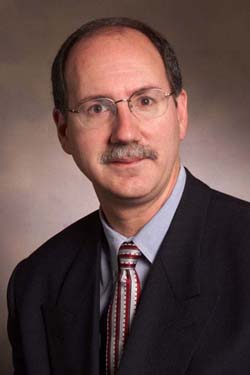
Dr. Robert Dittus directs the center.
Research center discovers ‘workable solutions for modern-day problems’
Health care is facing many fundamental challenges in America today. The system must incorporate an expanding inventory of diagnostic and therapeutic approaches, while working to deliver such care in a safe, timely, and cost-effective manner. To meet these challenges, health care providers must not only develop new fiscal and delivery strategies for care, but also continually revise the content of care that is being delivered to specific patients.
Vanderbilt’s research commitment to answering these challenges is embodied in the Center for Health Services Research (CHSR) at Vanderbilt University Medical Center. Dr. Robert S. Dittus, Joe and Morris Werthan Professor of Investigative Medicine, was appointed Director of the CHSR at Vanderbilt in March 2000. Since arriving at Vanderbilt in 1997, Dittus was aware of the potential for developing a research group that would specifically address health care issues relevant to VUMC and the health care system at-large. “We wanted to bring together scientists and other professionals for the specific purpose of discovering workable solutions for modern-day problems in health care delivery and organization,” Dittus said.
“A modern academic medical center cannot be without a strong program in epidemiology, clinical outcomes, and health policy,” said Dr. Eric G. Neilson, Hugh Jackson Morgan Professor and Chairman of the Department of Medicine, “Bob has done a superb job of launching this interdisciplinary program, and we fully expect it to become an important inter-institutional resource for the whole campus.”
Dittus began to recruit scientists who shared his vision and developed 10,000 square feet of office space on the sixth floor of Medical Center East into what is now CHSR. Today, CHSR has 31 core faculty members, 45 affiliated faculty, eight fellows, and 20 staff who represent many disciplines including clinical medicine, nursing, public health, social sciences, management sciences, and the humanities. The Center has six research units: clinical epidemiology and outcomes research, clinical improvement and operations research, clinical economics and decision science, chronic disease and molecular epidemiology, behavioral health, and health policy. The best demonstration of the center’s rapid growth is its active portfolio of $70 million in current research funding and an additional $10 million in pending applications.
“Our conceptual framework is centered around an ultimate goal of finding interdisciplinary opportunities to improve health care outcomes for our patients and the populations we serve,” Dittus explained. “To do so means reaching our penultimate goal—to create health care systems which satisfy the six criteria for patient care as established by the Institute of Medicine. That is, we want to make health care safe, timely, effective, patient-centered, efficient, and equitable.
“Basically, our focus is to analyze what we do and how we can do it better. An interdisciplinary approach is essential to identifying and implementing new approaches to care that can make a difference.”
CHSR’s efforts have already made an impact on the national health care system. This past July, Medicare agreed to provide for colonoscopy screenings, a benefit not previously covered. The policy change came in part due to studies conducted by Dittus and Dr. Reid Ness, assistant professor of Medicine, which demonstrated colonoscopy screening as an effective and cost-efficient tool in significantly reducing mortality due to colon cancer.
Other cancer studies at CHSR include the Southern Community Cohort Study. Funded by a $22 million grant from the National Cancer Institute, this population study of 105,000 people is headed by William Blot, Ph.D., professor of Medicine. The study aims to identify the factors responsible for racial differences in cancer incidence and patient outcomes. Epidemiologists Dr. Xiao-Ou Shu, associate professor Medicine, and Dr. Wei Zheng, professor of Medicine, are directing multiple studies examining the effects of nutrition, genetic factors, lifestyle habits, and environment on cancer incidence. These studies are being done in cooperation with local Nashville hospitals, several medical centers across the United States, and the Shanghai Cancer Institute in Shanghai, China. “Some of these studies are the largest ones of their type that have ever been done,” Zheng said. “These data can then be applied to future studies, as well. Through them, we hope to identify important risk and protective factors that will be useful in the prevention of common cancers.”
Other projects at CHSR include a study by Dr. William Cooper, assistant professor of Pediatrics, who is examining the effects of Medicaid policies on health outcomes in children. This research focuses on the disparities in patient care and compliance among children enrolled in TennCare. Meanwhile, Dr. Tina V. Hartert, assistant professor of Medicine, is in charge of a study on asthma patients as part of CHSR’s Asthma Epidemiology Research Group. Hartert is examining the appropriateness of care for asthma patients, the prevalence of viral infections among asthmatics, and the effects of influenza infections on pregnant women and their fetuses. Last April, the Reporter also highlighted an ongoing study by Dr. Wesley Ely, assistant professor of Medicine, and his colleagues on managing delirium in ICU patients. The group was the first to develop an instrument that allows nurses to monitor ICU patients for delirium, even patients who are receiving mechanical ventilation and other forms of life support.













